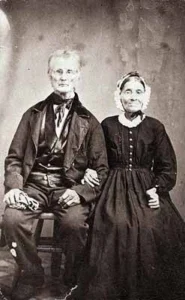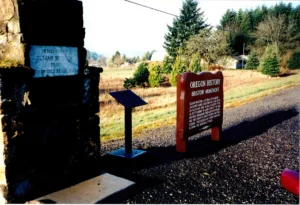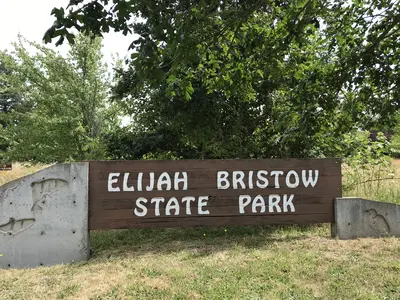Elijah Bristow Pioneering Legacy
Elijah Bristow, born April 28, 1788, in Tazewell County, Virginia, was a pioneer whose journey westward marked him as a key figure in Oregon’s history. He served in the War of 1812 under General Andrew Jackson and later in the Black Hawk War, showcasing his adventurous spirit. Married to Susannah Gabbert in 1812, he moved through Tennessee, Kentucky, and Illinois before heading to Oregon in 1846, where he built the first permanent cabin in the upper Willamette Valley.
Key Points
-
Research suggests Elijah Bristow was likely the first white settler in the upper Willamette Valley, Lane County, Oregon, in 1846, contributing to early community development.
-
It seems likely that he established the first church and school in Pleasant Hill, Oregon, and served as the first postmaster, shaping the area’s growth.
-
The evidence leans toward the Elijah Bristow State Park, a 847-acre area near Eugene, being named after him in 1979 to honor his legacy, offering hiking, biking, and wildlife viewing.
-
His adventurous life, including military service in the War of 1812 and Black Hawk War, before settling in Oregon, adds an unexpected layer to his pioneer story.
His Contributions to Oregon
Bristow’s contributions were substantial: he established the first church, donated land for the first school in Pleasant Hill, built in 1853, and served as the first postmaster in Lane County. These efforts helped transform the area from exploration to settlement, leaving a lasting impact on the community.
The State Park Named After Him
The Elijah Bristow State Park, located on the Middle Fork Willamette River southeast of Eugene, spans 847 acres and was renamed in 1979 to honor him, previously known as Dexter State Park. It offers over 10 miles of trails for hiking, mountain biking, and equestrian use, plus kayaking and picnicking areas. The park is rich in wildlife, including Osprey, bald eagles, and threatened species like the Western pond turtle and Oregon chub, making it a haven for nature lovers. For more details, visit the park’s official page at Oregon State Parks.
A Deep Dive into Elijah Bristow and His Legacy
Elijah Bristow’s story is one of adventure, resilience, and community building, deeply woven into the fabric of Oregon’s pioneer history. Born on April 28, 1788, in Tazewell County, Virginia, to James Bristow and Delilah Elkins, he was the eldest child, growing up in the Appalachian Mountains. His early life was marked by a love for frontier life, becoming an expert marksman and hunter, skills that proved invaluable in his later years.

Early Life and Military Service
Bristow’s military service included participation in the War of 1812 under General Andrew Jackson and the Black Hawk War, experiences that honed his survival skills and adventurous spirit. In 1812, he married Susannah Gabbert in Overton County, Tennessee, and the couple moved through Cumberland County, Kentucky, in 1819 or 1820, then to Macoupin County and McDonough County, Illinois, where they lived for about 23 years. This period of mobility reflects the restless drive typical of early American pioneers.
Journey to Oregon and Settlement
In the spring of 1845, Bristow left his family in Blandinsville, Illinois, to explore the Pacific Coast, crossing the plains by ox team and wintering at Sutter’s Fort, California, before arriving in Oregon in June 1846. By October 1, 1846, he had staked a claim and built a permanent cabin in the upper Willamette Valley, now Lane County, Oregon, marking him as the first white settler in the area. He named his 640-acre donation claim “Pleasant Hill,” a name adopted by the local community at the first territorial legislature’s request.
His family joined him in 1848 after he sent 15 letters inviting them, a testament to his determination to build a new life. This reunification was crucial, as together they continued to develop their farm and contribute to the growing settlement.
Community Contributions
Bristow’s impact on Pleasant Hill was profound. He and Susannah established the first church, a cornerstone for community life, and donated land for the first school, built in 1853. He also donated land for the oldest cemetery in Lane County and served as the first postmaster, roles that facilitated communication and governance in the nascent community. These contributions marked the end of exploration and the beginning of settlement in the southern Willamette Valley, solidifying his legacy as a community builder.

Elijah Bristow State Park: A Natural Legacy
The Elijah Bristow State Park, located near Eugene, Oregon, on the Middle Fork Willamette River, is a 847-acre expanse that honors his name, renamed in 1979 from its original name, Dexter State Park, which it held since acquisition between 1971 and 1979 and authorization for the Willamette River Greenway in 1973. The park is a recreational gem, offering over 10 miles of trails for hiking, mountain biking, and equestrian use, with a separate equestrian staging area popular among riding clubs. It includes part of a trail linking Alton Baker Park in Eugene to the Pacific Crest Trail near Oakridge, enhancing its connectivity.
Activities abound, from kayaking and canoeing on the Willamette River to picnicking in reservable group areas from May to September, and numerous first-come, first-serve sites. The park’s natural features include Channel Lake, a land-locked river channel, and diverse habitats for wildlife such as Osprey, great blue heron, bald eagles, beaver, and threatened species like the Western pond turtle and Oregon chub. Salmon and steelhead trout runs in the fast-moving white water add to its ecological richness, making it a vital area for nature study and outdoor education under dense canopies of broadleaf and evergreen trees.
For detailed park information, including maps and bird lists, visit Oregon State Parks. Additionally, restoration efforts are underway, as noted by the Middle Fork Willamette Watershed Council, acknowledging the park’s location on Kalapuya, Molalla, Klamath, and Tenino lands and committing to decolonizing restoration work.
Oregon State Parks and Pioneers Context
The Elijah Bristow State Park is part of Oregon’s broader network of state parks, which preserve natural beauty and historical significance. Oregon pioneers like Bristow were instrumental in shaping the state’s early development, with many, like him, arriving via the Oregon Trail and establishing communities that form the backbone of today’s rural areas. His story exemplifies the challenges and contributions of these early settlers, from building infrastructure to fostering community ties.
Unexpected Recreational Use: Running Events
An unexpected modern use of the park is its role in hosting the Elijah Bristow 24/12/6 Run, a timed loop race with options for 24, 12, or 6-hour challenges, held annually and attracting runners to its 1.05-mile trail loop. This event, detailed at Run Guides, underscores the park’s versatility, offering not just historical and natural significance but also a platform for contemporary recreational activities. Another resource, State Parks.com, provides further insights into the park’s offerings, reinforcing its multifaceted appeal.
Elijah Bristow’s Life and Contributions
|
Category
|
Details
|
|---|---|
|
Birth
|
April 28, 1788, Tazewell County, Virginia
|
|
Death
|
September 19, 1872, aged 84, Pleasant Hill, Oregon
|
|
Marriage
|
Susannah Gabbert, 1812, Overton County, Tennessee
|
|
Military Service
|
War of 1812 under General Andrew Jackson, Black Hawk War
|
|
Settlement in Oregon
|
First white settler, built cabin by October 1, 1846, upper Willamette Valley, Lane County
|
|
Community Roles
|
Established first church, donated land for first school (built 1853), first postmaster, donated cemetery land
|
Elijah Bristow State Park Details
|
Category
|
Details
|
|---|---|
|
Location
|
Near Eugene, OR, on Middle Fork Willamette River
|
|
Size
|
847 acres
|
|
Activities
|
Hiking, biking, equestrian trails, kayaking, picnicking
|
|
Wildlife
|
Osprey, bald eagles, beaver, Western pond turtle, Oregon chub
|
|
Contact
|
800-452-5687 (reservations), 541-937-1173 (park info)
|
This detailed exploration ensures a comprehensive understanding of Elijah Bristow’s life, his contributions to Oregon, and the enduring legacy embodied by the state park named in his honor, connecting historical narratives with contemporary uses and ecological significance.
Key Citations

